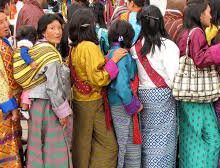
Bhutan's enduring gratitude towards the Wangchuck dynasty is palpable. From the historical unification of our nation to its ongoing development, the first, second, and third kings worked tirelessly to foster progress and unity. The legacy of inviting Nepali speakers from Nepal to contribute to Bhutan's prosperity continues to earn global admiration. This vibrant Nepali-speaking community, known as Lhotshampa, carries a rich cultural heritage and a reputation for architectural prowess. These individuals are renowned as Gurkhas, celebrated for their valor against British and foreign forces with their iconic khukuri swords.
Historical Context
In the era of British rule over India, the formidable Gurkhas, including those from Nepal and Bhutan, were an insurmountable force. Bhutan's strategic placement of the Nepali-speaking population along the southern border with India showcased a sagacious move.
However, with India's independence in 1947 came new complexities. The nation divided into Bharat and India, reflecting different ideological inclinations. While some remained loyal to British influences, others leaned towards a spiritual and loyal connection with Bharat. This division gave rise to unease about the Lhotshampa population in southern Bhutan.
The Fourth King's Era
The fourth king of Bhutan faced challenges associated with Indian influence. King Jigme's focus on consolidating power resulted in a bias against the Lhotshampa population. India's influence played a role in the division and fragmentation of Bhutan. In 1988, Bhutan classified the Lhotshampa families into seven categories, further deepening the divisions.
Shift in Foreign Policy
During this period, Bhutan also ceded its foreign policy to India, creating a significant power shift in the region. While Bharat has maintained its friendship with Nepal and the Lhotshampa community in Bhutan, India has pursued a different path.
Challenges and the Need for Solutions
On May 5, 1991, King Jigme Singye Wangchuk expressed concern about the threat to Bhutan's survival due to an uprising by Nepali-speaking militants. However, at that time, these Nepali speakers were actively contributing to Bhutan's development, largely uninvolved in politics. The King's declaration raised questions about its authenticity.
Unresolved Issues
This period saw the eviction of a significant number of people of Nepali heritage and the division of families, along with the confiscation of their property. It also involved the capture of students and accusations of wrongdoings against those who voiced concerns. These events led to doubts about Bhutan's commitment to its population.
India's actions didn't stop there; they planted Bodos in southern Bhutan, exacerbating tensions. Some Bhutanese patriots organized marches for change but were labeled as terrorists, resulting in the eviction of over a hundred thousand Lhotshampa people from Bhutan. The Royal Bhutan Army conducted operations in 2003 and 2004, marking a significant shift.
Solutions
To address these issues, it is essential to consider several steps:
U.S. Embassy in Bhutan: Establishing a U.S. embassy in Bhutan can help initiate reconciliation and provide support to the separated families and address property disputes.
Release of Political Prisoners and Refugee Repatriation: King Jigme's call for "honest, sincere, and genuine dialogue" should guide the repatriation of people from refugee camps in Nepal who wish to return to Bhutan. The release of political prisoners is also crucial, overseen by an independent commission led by U.S. and UN agencies.
Recognition of Resettled Bhutanese: Resettled Bhutanese refugees living in various countries should be granted Non-Resident Bhutanese (NRB) status to support Bhutan's financial development.
China's Interests and Unity
Amidst these challenges, China's interest in Bhutan poses a significant concern. To counter this, it is imperative for India and Bharat to unite and put aside differences. The shared cultural and religious affinities between Bhutan and China create an even greater need for unity to ensure peace. The recent move by Bhutan to boycott India and the West is not a good signal for peace and unity. Bhutan should never boycott India and or the west.
The Role of the Fifth King
With the fifth king's astuteness and knowledge, Bhutan can rectify the challenges created during the fourth king's era. India's support in resolving the human rights crisis in Bhutan is essential. An open, sincere, and genuine dialogue between Bhutan and Bhutanese refugees can pave the way for lasting solutions. The lessons learned from the struggles of journalists like Namgye Jam and Dr. Ricki, who dared to express dissenting views, must not be forgotten.
As Bhutan navigates this complex journey, there is hope that with the right steps and international support, the nation can heal, unite, and find its path to lasting peace and prosperity.
Niroula, a Bhutanese refugee resettled in the United States of America, us journalist. He authored the book titled "The Forgotten Story and currently lives in Lebanon, Pennsylvania, following his resettlement.

















